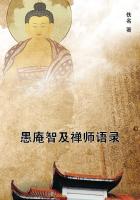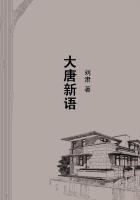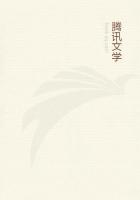Even Hegel, who taught that every notion included its own negation, used the negation only to reach a "larger synthesis," till he reached the universal which thinks itself, contradiction and all. The Church alone had constantly protested that anarchy was not order, that Satan was not God, that pantheism was worse than atheism, and that Unity could not be proved as a contradiction.
Karl Pearson seemed to agree with the Church, but every one else, including Newton, Darwin and Clerk Maxwell, had sailed gaily into the supersensual, calling it: -- "One God, one Law, one Element, And one far-off, divine event, To which the whole creation moves." Suddenly, in 1900, science raised its head and denied.
Yet, perhaps, after all, the change had not been so sudden as it seemed.
Real and actual, it certainly was, and every newspaper betrayed it, but sequence could scarcely be denied by one who had watched its steady approach, thinking the change far more interesting to history than the thought. When he reflected about it, he recalled that the flow of tide had shown itself at least twenty years before; that it had become marked as early as 1893; and that the man of science must have been sleepy indeed who did not jump from his chair like a scared dog when, in 1898, Mme. Curie threw on his desk the metaphysical bomb she called radium. There remained no hole to hide in. Even metaphysics swept back over science with the green water of the deep-sea ocean and no one could longer hope to bar out the unknowable, for the unknowable was known.
The fact was admitted that the uniformitarians of one's youth had wound about their universe a tangle of contradictions meant only for temporary support to be merged in "larger synthesis," and had waited for the larger synthesis in silence and in vain. They had refused to hear Stallo. They had betrayed little interest in Crookes. At last their universe had been wrecked by rays, and Karl Pearson undertook to cut the wreck loose with an axe, leaving science adrift on a sensual raft in the midst of a supersensual chaos. The confusion seemed, to a mere passenger, worse than that of 1600 when the astronomers upset the world; it resembled rather the convulsion of 310 when the Civitas Dei cut itself loose from the Civitas Romae, and the Cross took the place of the legions; but the historian accepted it all alike; he knew that his opinion was worthless; only, in this case, he found himself on the raft, personally and economically concerned in its drift.
English thought had always been chaos and multiplicity itself, in which the new step of Karl Pearson marked only a consistent progress; but German thought had affected system, unity, and abstract truth, to a point that fretted the most patient foreigner, and to Germany the voyager in strange seas of thought alone might resort with confident hope of renewing his youth. Turning his back on Karl Pearson and England, he plunged into Germany, and had scarcely crossed the Rhine when he fell into libraries of new works bearing the names of Ostwald, Ernst Mach, Ernst Haeckel, and others less familiar, among whom Haeckel was easiest to approach, not only because of being the oldest and clearest and steadiest spokesman of nineteenth-century mechanical convictions, but also because in 1902 he had published a vehement renewal of his faith. The volume contained only one paragraph that concerned a historian; it was that in which Haeckel sank his voice almost to a religious whisper in avowing with evident effort, that the "proper essence of substance appeared to him more and more marvellous and enigmatic as he penetrated further into the knowledge of its attributes -- matter and energy -- and as he learned to know their innumerable phenomena and their evolution."
Since Haeckel seemed to have begun the voyage into multiplicity that Pearson had forbidden to Englishmen, he should have been a safe pilot to the point, at least, of a "proper essence of substance" in its attributes of matter and energy: but Ernst Mach seemed to go yet one step further, for he rejected matter altogether, and admitted but two processes in nature -- change of place and interconversion of forms. Matter was Motion -- Motion was Matter -- the thing moved.
A student of history had no need to understand these scientific ideas of very great men; he sought only the relation with the ideas of their grandfathers, and their common direction towards the ideas of their grandsons.
He had long ago reached, with Hegel, the limits of contradiction; and Ernst Mach scarcely added a shade of variety to the identity of opposites; but both of them seemed to be in agreement with Karl Pearson on the facts of the supersensual universe which could be known only as unknowable.
With a deep sigh of relief, the traveller turned back to France. There he felt safe. No Frenchman except Rabelais and Montaigne had ever taught anarchy other than as path to order. Chaos would be unity in Paris even if child of the guillotine. To make this assurance mathematically sure, the highest scientific authority in France was a great mathematician, M.
Poincaré of the Institut, who published in 1902 a small volume called "La Science et l'Hypothèse," which purported to be relatively readable.
Trusting to its external appearance, the traveller timidly bought it, and greedily devoured it, without understanding a single consecutive page, but catching here and there a period that startled him to the depths of his ignorance, for they seemed to show that M. Poincaré was troubled by the same historical landmarks which guided or deluded Adams himself:
"[In science] we are led," said M. Poincaré, " to act as though a ****** law, when other things were equal, must be more probable than a complicated law. Half a century ago one frankly confessed it, and proclaimed that nature loves simplicity. She has since given us too often the lie.














